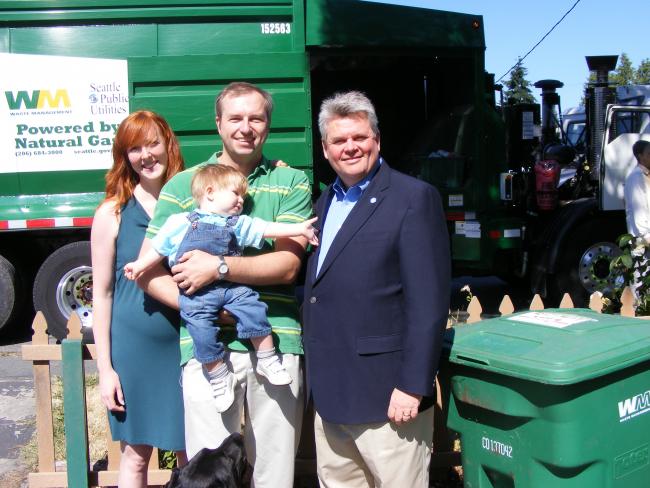Mayor announces new city record for recycling
Leah and Yarek Rivers, with their 18-month son Leto stand with Mayor Nickels on July 1 when he announced the city had set a new city record for recycling in 2008.
Wed, 07/01/2009
Mayor Greg Nickels announced today that Seattle set a new city record for recycling in 2008, with 50 percent of the city’s residential, commercial and self-haul waste being recycled instead of going to the landfill.
This is up 1.8 percentage points from 2007, and marks the fifth straight year of increased recycling for the city of
Seattle.
“The credit for this milestone really belongs to everyone in Seattle for taking small, simple steps every day,” said Nickels. “People have taken recycling to heart. It’s part of our values, and what makes Seattle a great place.”
The city of Seattle’s diversion rate dipped to 38.2 percent in 2003, prompting Nickels to push the city’s goal to divert 60 percent of its waste through recycling and composting by 2012. The recycling rate has climbed steadily each year as the city greatly expanded its solid waste programs, taking steps such as offering food and yard waste collection to all businesses and residents, and free recycling for small businesses, as well as prohibiting recyclables in the garbage.
In 2008, Seattle’s single-family residents diverted 65.4 percent of their waste through recycling and composting, up from 64.8 percent in 2007. Multifamily residents recycled 28.3 of their waste, up from 27.6 the previous year.
Commercial recycling climbed 2.2 percentage points, to 54.7 percent in 2008. And 18.4 percent of waste dropped off at the city’s two recycling and disposal stations was diverted to recycling or compost in 2008. The figures are based on an annual waste audit conducted by Seattle Public Utilities. With increased recycling and less solid waste generated last year, Seattle reduced the amount of garbage shipped to a landfill in Arlington, Ore., by 40,000 tons.
Seattle’s recycling rate is expected to continue increasing, in part because the city launched new residential services on March 30, 2009, including:
● More paper, plastic and metal can be recycled, including all rigid plastic food containers, plastic plant pots, large lids, and aluminum foil and foil trays, as well as plastic and paper cups.
● All recycling goes into one recycling cart - no more separating glass bottles and jars.
● Weekly food and yard waste collection.
● All food scraps, including meat, fish and dairy, can go in food and yard waste carts.
● Electronics, used motor oil and bulky items can now be collected using special services.
Upgrades to Seattle’s recycling facility now allow more recyclables to be made into new, useful products. Food and yard waste is delivered to a high-tech facility where an advanced process breaks down harmful bacteria and chemicals, and turns the waste into compost for local parks and gardens.
The national recycling average is 32.1 percent. While each city calculates its diversion rates differently, Seattle, San Francisco and Portland are among the leaders in municipal recycling. Seattle’s rate includes recycling set out for collection by businesses and residents, materials hauled to the city’s recycling and disposal stations and on-site composting.
Some other cities include private recycling of construction, demolition and hazardous materials.


